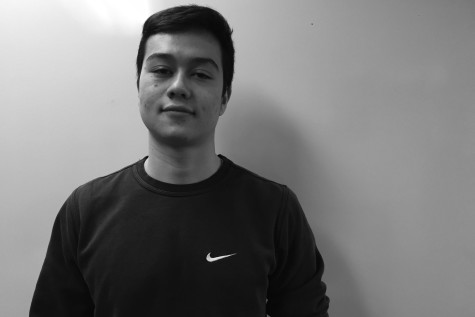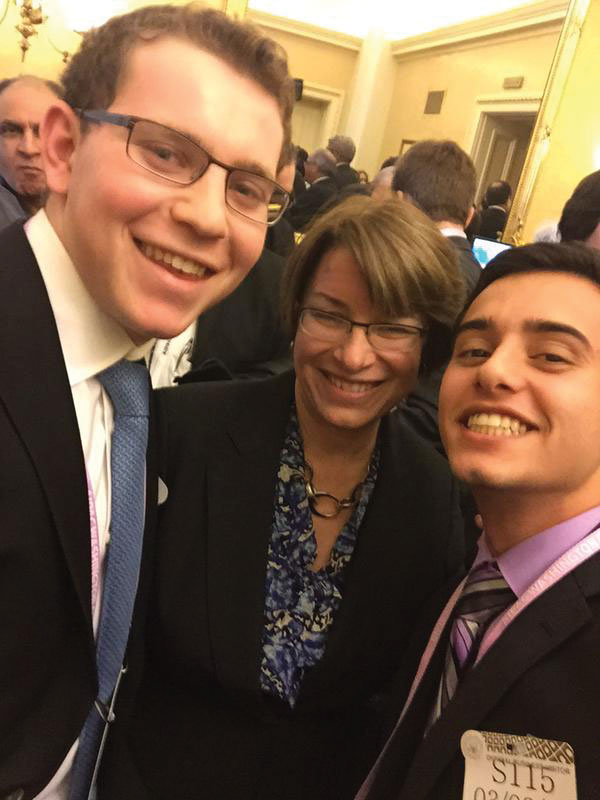Junior travels to AIPAC
How AIPAC creates a safe enviornment in a time of controversy
“My friend was called both a baby killer and a Nazi.”
A member of the Class of 2016 is proud of his Jewish identity and is a staunch supporter of Israel. During the first three days of March, he attended the annual AIPAC Policy Conference in Washington, D.C.
While there, he got to hear many speakers, but was also met with protesters who offered the sentiment in the opening statement.
AIPAC stands for the American Israel Public Affairs Committee and is the main American lobbying group that advocates pro-Israel policies to the United StatesCongress and Executive Branch.
Each morning, between 20 and 30 people were present to protest both the people and the policies of AIPAC. One of those protesters was responsible for the opening sentiment. An organization called Code Pink organized the protests against AIPAC through the Twittersphere. Most of the protesters were peaceful. However, some were taken into custody by the police. The student states that “a lot of [the turmoil] was frustration with policies of the Israeli government and a lot of [protesters] were making claims that did not make sense.”
He continued, saying “The protesters did not have much of an effect on the inner event, but it was still interesting to see people protesting. We also saw a devout Christian who was protesting the protesters. He told [me and my friends] that he has been doing this for the last 12 years, making the long drive from Tennessee to show his support for Israel.”
He was not the only student that attended the conference. Out of the 16,000 people who attended the AIPAC conference, 3,000 were students. Those 3,000 students were both college students and high school students. Hillel Jewish organizations at universities gave scholarships and sponsored some students so that they could attend the conference for free. Likewise, some of the events at AIPAC were only directed towards students.
He traveled with friends that attend his Jewish summer camp, Herzl, as well as friends that he travelled to Israel with last summer. He also had the opportunity to connect with former Blake classmate Max Rotenberg, who now lives in the Baltimore area. Rotenberg, also Jewish, is a particularly big supporter of Israel and was an outspoken member of the World Literature and Culture classes where the Israel/Palestine issue was discussed.
He also had the opportunity to chat with Minnesota Senators Amy Klobuchar and Al Franken (Blake Class of ‘69). In addition to face time with local politicians, he attended General Assemblies in which prominent political figures gave speeches and held sessions. These figures included Benjamin Netanyahu, Prime Minister of Israel; Samantha Power, U.S. Ambassador to the United Nations; Susan Rice, U.S. National Security Advisor; Bob Menendez, senior U.S. Senator from New Jersey; Lindsey Graham, senior U.S. Senator from South Carolina; and Mosab Hassan Yousef, a Palestinian and son of a prominent Hamas leader who became allied with Israel and worked undercover for Shin Bet, Israel’s internal security service.
At the convention, he had the opportunity to attend many different showcases, including an Innovation Showcase in which new Israeli technological developments were unveiled.
Likewise, breakout sessions were available for participants to attend in between general sessions. These sessions were on several topics that included the “Iranian situation,” the history of the Israel/Palestine Conflict from multiple perspectives, and the history of different aspects of Israeli culture. Israel’s environment and the history of the land were also covered.
When asked how Israel influenced his Jewish identity, he replied, “A huge part of Judaism is Israel and [how] they are interconnected. It’s the homeland of Jewish people. In times of stress and with the rise of anti-semitism in Europe and a little bit in the United States too, stuff like anti-semitic violence on college campuses and the BDS movement (Boycott Divestment and Sanctions of Israel)… it’s important to have a place that you can call home, no matter what happens.”
He also reflected on his summer trip to Israel: “ Being there in the summer… there is nothing like it in the world. No where else in the world is there a Jewish majority. It is an amazing place and finally getting to experience it this summer was amazing. I feel connected to [Israel] and I feel that it’s an integral part to every Jewish identity.”
He concluded, saying, “No matter who supports Israel and who doesn’t, no matter the politics, there’s always going to be people supporting Israel. At the conference I was comforted that a lot of people know the truth in a time with lots of yellow journalism and twisted stories… I came away feeling that more people were understanding the truth. It was good to see lots of support for Israel. Getting involved and having an impact is something I’d like to do. Being a part of this really showed me the strength of Israel as well as its strong, growing relationship with the U.S.”

John has been a Spectrum Editor since the spring semester of his sophomore year. He is a proud member of the great class of 2016. John does not actually...






